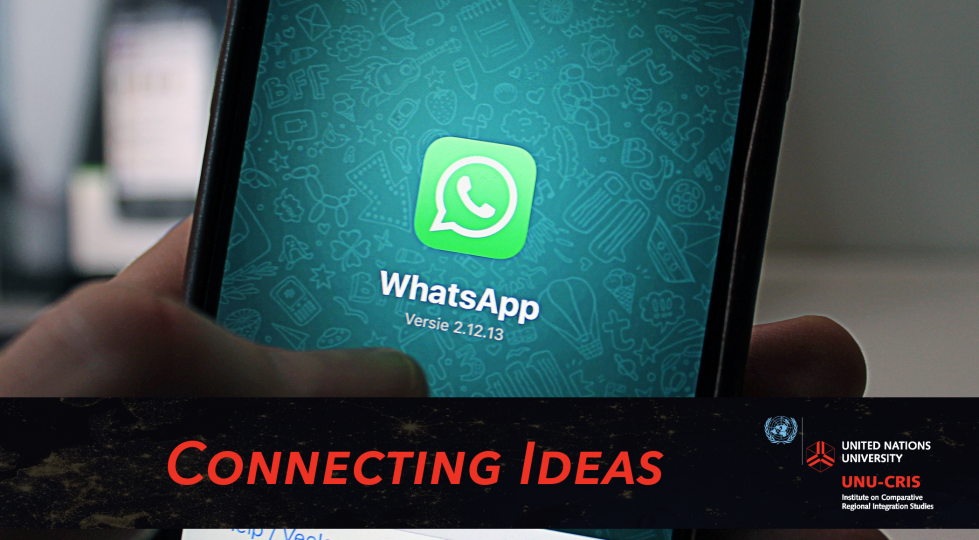Fighting COVID-19 Using WhatsApp Messenger: The Case of Africa


19 November 2020 | #20.34 | The views expressed in this post are those of the author and may not reflect those of UNU-CRIS.
WhatsApp Messenger has become the most popular messenger application on the African continent for a variety of reasons, most prominently as a news source. In Zimbabwe, WhatsApp alone accounts for almost half of all internet traffic and this is a trend repeated in many African countries, with some countries having even higher usage, such as Kenya, which is estimated to be 74%. However, while it has proven to be a useful tool for the distribution of information and has been helpful in the fight against the novel coronavirus disease (COVID-19) such as alerting people to wash their hands and practice good hygiene, it has unfortunately been a source of fake news as information is easily “shared” by its users, often without fact-checking, which has caused panic amongst some sections of the population. The importance of this application in fighting the coronavirus is immense as WhatsApp is the most popular platform in Africa. In this blog post, I will discuss how this platform has been used to tackle this pandemic, how governments have responded to this platform and its role in regional integration in the African continent, and whether it can be an effective tool for the continent to prepare for the next health crisis.
WhatsApp and COVID-19
Since the start of this pandemic, WhatsApp was already put to the ultimate test with misinformation being widely spread as very little was known about COVID-19 in the beginning, creating an atmosphere that was ripe for fake news about this virus to prevail. This has prompted African governments to team up with technology giants such as WhatsApp to halt the spread of misinformation which has proven to be a difficult task. WhatsApp recently imposed stricter limits to the number of forwarded messages, which was previously five, to just one. Although this does not completely prevent the spread of misinformation, it at least reduces its spread by four-fifths or 80%. Despite the drawbacks from this messaging application, the benefits are profound, and recently a South African organisation developed a WhatsApp bot to provide the latest information on the coronavirus. This company mentioned that it was “offering a WhatsApp-based helpline, real-time data, and automated responses to common questions in numerous languages” on COVID-19 as a Health Alert, which has proven to be so popular that the World Health Organisation (WHO) partnered with the company, Praekelt.org, to create a similar bot to reach a global audience.

Harnessing WhatsApp’s Potential Regionally to Counter COVID-19
It is clear from the information stated in the first paragraph that WhatsApp has a very powerful platform on the African continent. Hence, African governments need to use this platform significantly to spread awareness about COVID-19 so that their citizens are well informed. In order to make effective strides in combating this virus, which is currently on the rise on the continent, a regional response is of absolute necessity. The African Union (AU) in this regard is the institution in question and has already acted quickly to come up with frameworks to counter the spread of the coronavirus. One such strategy being the Africa Joint Continental Strategy for COVID-19 OUTBREAK which supports collaboration across the AU in line with the guidance stated by the Africa Centres for Disease Control and Prevention (Africa CDC). In this strategy, under section 2.5 of its second objective: Risk Communication and Social Engagement, it states working with the media and “continuous engagement with traditional and social media”, and this includes social media sites such as WhatsApp.
Thus, the AU in this respect needs to harness this messaging application and perhaps it could be hugely beneficial if the AU partners with Praekelt.org so as to reach more people on the continent with messages regarding COVID-19 “on topics ranging from symptoms of the disease and where to get tested to debunking myths about it” as mentioned in Bloomberg. As Member States of the AU work closely together on such initiatives on combating COVID-19 the higher the chances of halting the spread of this disease on the continent which will only be a success with all Member States of the AU playing their part and following health regulations as stipulated by the Africa CDC and WHO. In the long run, this proposed initiative of the AU collaborating with Praekelt.org could be effective in preparing the continent for the next health crisis due to the vast use of WhatsApp on the continent and this platforms ease of receiving messages relatively quickly and in real-time.
The Drawbacks of Using WhatsApp in Africa
While WhatsApp is indeed the most popular messaging application on the continent, its effectiveness has often been hampered not only by misinformation but also by some governments themselves which have either temporarily shut down the internet or blocked social media sites for a variety of reasons. The most prominent one being due to national security concerns as stated by Freedom House, particularly during politically contentious times. Several African countries have already undertaken such initiatives despite the ongoing coronavirus pandemic, including Burundi during its 2020 presidential election and Mali as anti-government protests ensue. Hence, the need for the AU to encourage Member States to take active steps to support press freedom and understand the importance of keeping such platforms open as the role that they play in society could really be useful in ‘life and death situations’ such as during the occurrence of pandemics.
